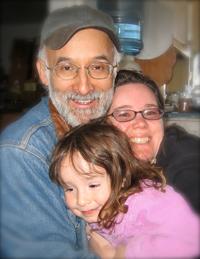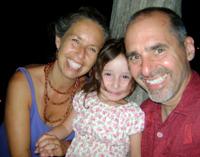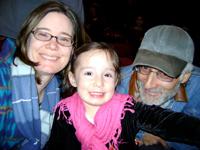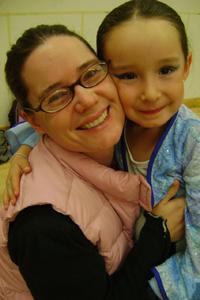Author: Ma’ikwe Schaub Ludwig
Published in Communities Magazine Issue #146
During one of my son’s brief forays into something resembling regular “school,” I picked him up one day and was greeted by a quiet and somewhat perplexed version of my usually gregarious child. When I asked him what was on his mind, he reported that the class had been assigned a genealogy project, and he was to bring to school the next day a family tree.
“Let me guess,” I said, feeling a wave of both amusement and compassion. “You’re having trouble figuring out who to include?”
Jibran was raised in a scene where the lines between community and family were a bit fuzzy, to put it mildly. Even if he’d been asked to simply represent his siblings, parents, grandparents, and aunts and uncles, he’d be sketching something closer to “bush” than “tree.” His dad, Marqis, for instance, can legitimately be referred to as either an only child, one of four, or one of 10, depending on whom you count. And do you count your parents’ current partners? Or just legally sanctioned relationships? And if the latter, do you then take the opportunity to share the story with your second-grade classmates about the time your dad made you look up every swear word he’d ever heard you utter in the dictionary, only to discover that the word “bastard” was actually an accurate label for yourself?
The timing of the assignment made for even more intense soul-searching on Jibran’s part: I was eight months pregnant with his half-sister, Ananda. And while halfs- and steps- could hardly have been that strange in his alternative school, the circumstances around this child surely were.
Let me back up.
Jibran has spent his whole life living in some version of community. When we were pregnant with Jibran, we made our first family move to living communally, and he’s been raised with a healthy mix of strong parental ties and having lots of kids and adults in his life that mattered a lot, but aren’t related. He is highly independent, has influences from dozens of adults who have been in his life, and is amazingly socially savvy for a 12-year-old. And he has, in many ways, never truly been “mine.”
Jibran’s name was inspired by Kahlil Gibran’s poem, “On Children”:
Your children are not your children.
They are the sons and daughters of Life’s longing for itself.
They come through you, but not from you,
And though they are with you yet they belong not to you…
We loved this poem, both Marqis and I, and when he suggested that the child in my belly might be named Jibran, we both had an immediate sense of rightness, and never re-opened the boy’s name conversation again. And after all our years in community, Jibran embodies the poem beautifully.
What I didn’t understand, until I found myself unexpectedly pregnant eight years after naming our first child, is how profoundly having a community kid has affected my development as a parent (and, more importantly, as a person). I decided fairly early on that I didn’t need that second child I’d dreamed of as a teenager; if we were going to live in community, Jibran had access to lots of playmates and I could cuddle all kinds of cute babies without needing to make more myself. And so when I was told by a medical practitioner that I probably couldn’t have any more, that news didn’t land hard for me; I was at peace with no more kids.
Suddenly, though, at the age of 34, I found myself staring at a positive pee test.
Community Kids
One of the major gifts of community for me is that, when I hit crisis moments, I’ve learned to open up and get bigger, rather than shrinking in on myself. My first urge is to lean into social relationships, because years of living with people has taught me that I am most creative and alive in connection with others. And years with Jibran have taught me that even the most primal of bonds, between parent and child, can be enriched by (and not, as fear might suggest, threatened by) letting that child find their right niche in the community.
Because Jibran blossomed with this freedom to connect, I slowly became a less attached parent—not less in love with or responsible for my kid, but less territorial about his time and mind. That, combined with my own sense that raising a second child was not right for me, allowed me to ask, “What else is going on in this situation?” I had taken on the sense from the Kahlil Gibran poem that this child may be coming through me but was not really mine.
In this case, the turning outward was both bigger than anything else I’d ever encountered and an easy call. Turns out that the day I got pregnant, two of my closest friends, Zaida and Denis, were at a personal growth course doing consciousness work around adopting a child. Zaida in particular wanted a child so much it hurt, and she was never going to have one of her own. After all that time in community, and in the face of her need, my having an abortion would have felt like a real betrayal of her; and raising another child when I intuitively knew it wasn’t the right thing for my own life would have been a betrayal of me. The bottom line: you simply don’t ignore a real human need that you can fill with your own “surplus” when you are in close, connected community.
There was also another way Jibran influenced the outcome. I made the mistake of leaving the pregnancy test sitting on my bed in my room. Jibran walked in to ask me something, picked it up and said, “What’s this?” It was one of those parental choice moments: I’d never lied to him…was I willing to not lie now? I closed my eyes for a minute, briefly considered the options, let out my breath and said, “It’s a pregnancy test.” After a moment of staring at me, he asked, “Well, are you pregnant?” And when I said yes, he asked me what I was going to do.
Ever tried talking about abortion with your seven-year-old? Once he understood what I meant, he was adamant: no way was I aborting his sibling. He’d been raised in this heavily relational environment and had heard me talk about how cutting people out was the last resort after trying everything you needed to in order to have a clear conscience. In this case, he’d internalized that value and for him, this child was already in the circle. It was both touching and a bit unnerving that he felt free to wade into the decision, and yet I couldn’t deny that it was largely my influence that led us to that moment.
And so sprouted another branch in my son’s family bush. Starting from the beginning of my pregnancy, the four parents set out to co-create a family around the child in my womb. Incidentally, Jibran liked our solution: he gets to have a sister, but doesn’t have to share mom. How good is that? Both of us felt—and still feel—that we didn’t “give Ananda up” so much as turn Zaida and Denis into family. Whatever the definition of family used to be in my life, it has long since been subsumed under years of sharing, reinvention, and expansion. Community—and Jibran—have gifted me with an ability to fold more humanity into my most intimate, cared-for circle and experience it as a gift.
The funny thing is, Ananda has also created more links in our blood families. Both of my parents and my brother were initially appalled by what we were planning. But with some time and a lot of reassurance from all of us, they’ve come around to having relationships with Ananda. My mom was there when she was born, sends birthday presents and demands pictures; my dad set up a college fund for her, just like the one Jibran has. When Laird and I got married, they all made the trip. During that night’s dinner, when Ananda had climbed up onto my lap, I turned my head to catch my dad gazing at us and got a smile from him as genuine and pleased as any I can remember.
Zaida’s parents (who, coming from Brazil, where open adoptions don’t even exist, had further to go than my folks to feel at peace with this) made a trip to the US in part to meet the “other parents” and had a similar experience of relaxing into it once they saw us all together. In short, at our invitation, they’ve all gotten on board with the idea that our families have gotten larger and richer. And if it is still a little weird, they are also proud when they talk about it.
Influence
What I’ve come to see is that community changes us. Because I came to live in community as an adult, it has been a tremendous influence on how I put my world together, and—in spite of being blessed with a basic values match with my blood family—that world looks notably different from the world of the rest of my blood family. It feels like my brain has been rewired over time by a different cultural context that is being created in the communities movement. Because Jibran was raised in community, all this stuff that seems radical and strange to us adults is just normal for him.
Still, I’m surprised when I find life presenting me with a new stretch to make, and am convinced that I am nowhere close to a finished community product in the relational department.
Mixing It Up
When Laird and I wed (adding a step-dad and two step-siblings to Jibran’s expanding bush) we had a four-day celebration that included special dinners with various subsets of people we love. Our family dinner included all the predictable people, plus Zaida, Denis and Ananda, and the other parents of all four of our kids. We had both gotten into occasional trouble with past partners for insisting that the exes with whom we’d made babies were, obviously, family even if we weren’t still partners. It was a relief when we got together that we shared an understanding in our bones of something so basic to both of our worldviews. We’ve both been trained by years of consensus that the key to happiness is greater inclusion, not less, and we are blessed with amicable and enjoyable relationships with a variety of ex-partners, including our co-parents.
What we didn’t have in common at the outset was our respective takes on monogamy. For all of the radical family stuff I’d done, I was pretty firm that monogamy was simpler and more my speed. Laird, on the other hand, just doesn’t seem wired that way. However, he also places a high value on our relationship, and so was willing to content himself with monogamy in order to be with me. And that was the basic arrangement of our relationship for the first three-and-a-half years.
My previous experiments into polyamory had been brief and, while neither had gone badly, I didn’t find myself having a strong need for more. One thing I did figure out, though, was that the best formula for me if I am going to re-open my relational field is having a very strong relationship with the other woman with whom I’m sharing a lover (in other words, what I’m not wired for at this point is love in isolation). Even early in Laird’s and my relationship, I could see that I might be open to polyamory under that same circumstance. It seemed highly unlikely, though, given our relatively small dating pool in northeastern Missouri (and even smaller “open to poly” pool…and, even smaller than that, people who’d be willing to put up with Laird and me pool…). So we had basically shelved that possibility and were busy creating a great marriage.
Things started to shift for me over the winter of 2008-2009. Laird and I both get crushes with some regularity, but they usually either fade out or stay at a level that is sweet and interesting but not very compelling. I realized at some point that the crush I’d developed on Ted shortly after coming to Dancing Rabbit hadn’t faded. My intuition (which seems to be getting both more insistent and more accurate as I head into my menopausal years) kept nudging me in Ted’s direction and I was starting to think I ought to pay attention to it, in spite of a strong self-image as monogamous.
And then the thoroughly mundane kicked in: we had a new crop of smart, sexy young interns show up in the spring. I realized one day that if Ted fell in love with one of them, I’d have a suddenly irrational personality change unbecoming of a woman almost 40. It felt like it was time to speak.
So after talking to Laird about it, I finally told Ted. (Do you have any idea how hard it is to find a really private space in a bustling ecovillage to have that conversation without half the world overhearing? I felt like a teenager again, sneaking around and shyly asking, “Uh, Ted…I have, uh, something, uh…Ihaveaconfessiontomake…” yikes!) Ted was interested, and Sara (his lovely long-term partner) was actually enthusiastic. Perhaps she, too, had noticed all the interesting young women? Or maybe she understands the same thing I do—that having great communication between the various loves is a really good way to go.
Jibran, when asked for his take on the possibility, simply said, “So long as this doesn’t mean Laird is going away, I’m cool with Ted.” He is ever my north star in understanding what family means, ever the community kid. Having gotten the blessing from the most important man in my life, I found myself giddy with new love and deeply grateful for having a husband who loves me as much as Laird does.
Although Ted’s and my experiment ended after about six months (with friendship intact and new perspective for both of us), Laird and I have been through an intense period of growth in our marriage. Somehow, Ted’s presence in my life pushed Laird and me to become more honest, hold our time together as more precious, and dropped us into a level of vulnerability that we had rarely gotten to before. I have jokingly said that if I knew our marriage would get this much stronger, I would have done this years ago…but the truth is, we’d gotten strong enough to be able to handle polyamory only recently, and strength of connection seems to me to be another requirement for making this work.
The Essence of Strength
Strength is the key theme when I look back at this ever-expanding and deepening thing in my life called “family.” I have come to believe that real strength is some combination of flexibility to explore what is really there and embrace it, plus creativity and vulnerability. It is more resilience than rigidity: more bamboo than oak.
And community is the essence of strength for me. We are all in this for some creative urge, some wanting life to be different than it is in the mainstream cookie-cutter reality that most of us come out of. Living with others means that we are constantly presented with both the hard and the interesting, constantly pushed to get more honest about what is true for us. When you lean into whatever presents itself, life gets more rich. Family for me seems to be a thing defined by how much of the cookie-cutter reality I am willing to let go of, and I haven’t hit the limits of that yet.
Permaculture tells us that the strength of a system is largely determined by the number of relationships between elements. If this is true, then my family is strong indeed! When I think of family, I find myself easily willing to include more and more people, and get a deep thrill when one branch of my family meets another and creates their own connections. And while I think this expansion runs the risk of having something sacred get watered down to the point of meaninglessness, the opposite feels true for me: this expanding definition of family feels like it sanctifies my life by seeing more people as being that important to me. I’m closer to Buddha now because “beloved” applies to so many different people in my life. I haven’t stopped loving my blood connections, but I have stopped thinking of them as trumping all when it comes to importance in my life. Like all definitions and boundaries (from nationalism to religious categories to race and any other way we define some as “us” and others as “them”), the implications of letting go the old meaning of family have been profound for me…and absolutely a product of community living.
The Next Generation
A while back, we were trying to figure out our family schedule for November, and it wasn’t coming together easily. Laird and I had one of our annual conference trips, and Jibran preferred to stay home at Dancing Rabbit where he has school and a vibrant batch of friends of his own. His dad was also having trouble getting his work schedule to line up easily in order to be at home with him the whole time. So Jibran went to work one evening at community dinner, arranging for alternate “parents” for a few days among his chosen clan. He has no problem with the expanding circle of family, and I already see him claiming his own group. The fun part is watching them claim him, too, accepting both the joy and responsibility for him for a few days. I think he’s learned the community lesson well.
Almost five years after his initial genealogy assignment, I’d like to see what that “family bush” of Jibran’s would look like today, with him starting to add his own twigs to the bush.





















